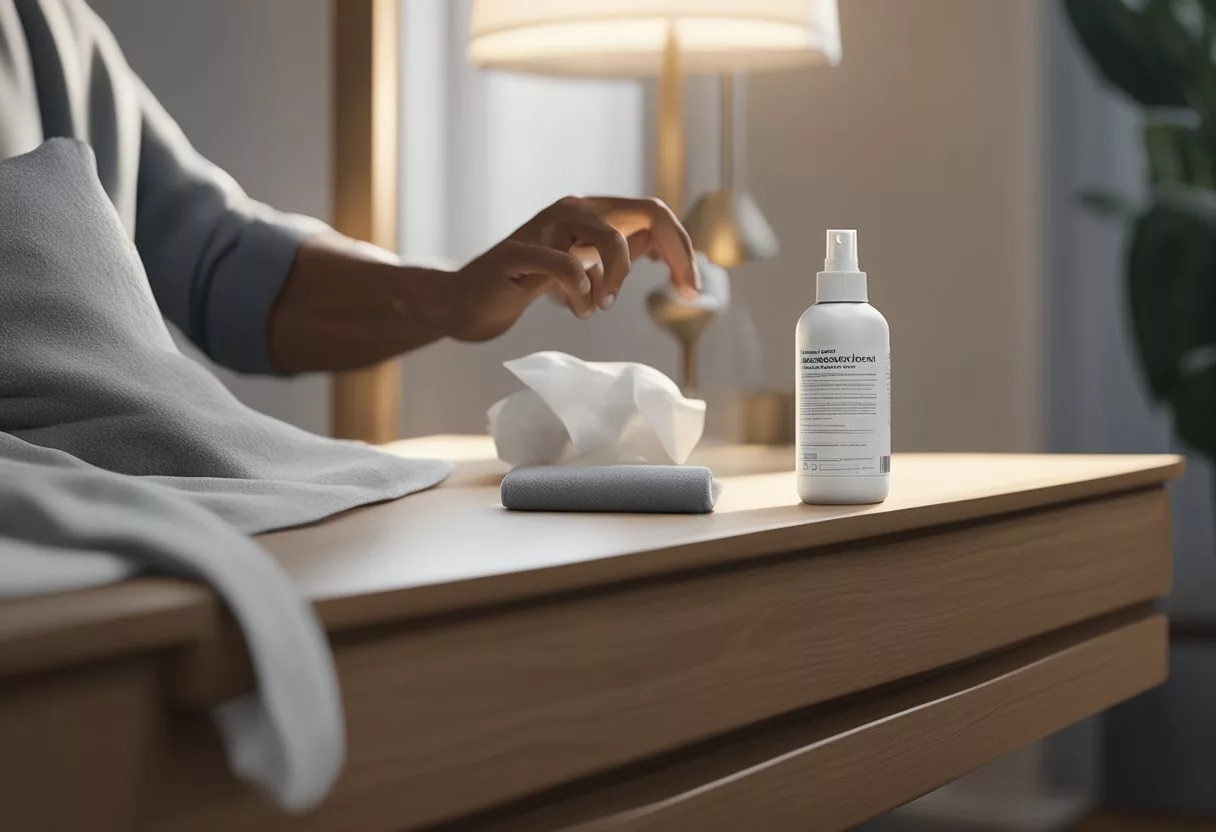Congestion is a common condition that affects millions of people worldwide. It can be caused by various factors, including allergies, infections, and environmental irritants.
Congestion can be uncomfortable and frustrating, but there are many ways to alleviate the symptoms and get back to feeling like yourself again.

Understanding the underlying causes of congestion is an important first step in finding relief.
Congestion can be caused by a variety of factors, including allergies, infections, and environmental irritants. It can also be a symptom of a more serious underlying condition, such as asthma or chronic obstructive pulmonary disease (COPD).
By understanding the cause of your congestion, you can better target your treatment options and find relief more quickly.
Key Takeaways
- Understanding the cause of congestion is an important first step in finding relief.
- Medical treatments, home remedies, and lifestyle changes can all help alleviate congestion symptoms.
- Preventive measures, such as avoiding triggers and maintaining good hygiene, can help reduce the frequency and severity of congestion.
Understanding Congestion

Congestion is a common condition that affects millions of people worldwide. It is characterized by a feeling of stuffiness or blockage in the nasal passages, making it difficult to breathe.
Congestion can be caused by a variety of factors, including colds, flu, allergies, viruses, bacterial infections, sinus infections, inflammation, swelling, and excessive mucus production.
Causes of Congestion
The most common cause of congestion is a viral infection, such as the common cold or flu. These infections can cause inflammation in the nasal passages, leading to swelling and mucus production.
Allergies can also cause congestion by triggering an immune response that leads to inflammation and excess mucus production.
Sinus infections, which are caused by bacteria or viruses, can also lead to congestion. Inflammation and swelling in the sinuses can block the nasal passages, making it difficult to breathe.
In some cases, congestion can be caused by non-infectious factors, such as exposure to irritants like cigarette smoke or pollution.
Types of Congestion
There are two main types of congestion: nasal congestion and chest congestion.
Nasal congestion is characterized by a feeling of stuffiness or blockage in the nasal passages, while chest congestion is characterized by a feeling of tightness or heaviness in the chest.
Nasal congestion is usually caused by inflammation and swelling in the nasal passages, which can be caused by a variety of factors, including colds, flu, allergies, and sinus infections.
Chest congestion, on the other hand, is usually caused by excess mucus production in the lungs, which can be caused by a variety of factors, including colds, flu, allergies, and bronchitis.
Medical Treatments

Decongestants
Decongestants are medications that help to relieve nasal congestion by narrowing the blood vessels in the nasal passages. This helps to reduce the swelling and inflammation that causes congestion.
They are available as over-the-counter medications and prescription medications.
One common decongestant is phenylephrine, which is available in nasal sprays, tablets, and liquids.
It is important to note that decongestants can cause side effects such as increased heart rate and blood pressure, so they should be used with caution and under the guidance of a healthcare provider.
Antihistamines
Antihistamines are medications that help to relieve allergy symptoms such as nasal congestion, sneezing, and a runny nose.
They work by blocking the action of histamine, which is a chemical released by the body in response to allergens.
One common antihistamine is loratadine, which is available as an over-the-counter medication.
Antihistamines can cause side effects such as drowsiness, dry mouth, and blurred vision, so they should be used with caution and under the guidance of a healthcare provider.
Nasal Steroid Sprays
Nasal steroid sprays are medications that help to reduce inflammation in the nasal passages, which can help to relieve congestion.
They are available as prescription medications and are often used to treat chronic congestion caused by allergies or other conditions.
Nasal steroid sprays work by reducing the production of inflammatory chemicals in the nasal passages.
They can cause side effects such as nasal irritation and nosebleeds, so they should be used with caution and under the guidance of a healthcare provider.
Antibiotics
Antibiotics are medications that are used to treat bacterial infections. They are not effective against viral infections, which are a common cause of congestion.
Antibiotics should only be used under the guidance of a healthcare provider and should not be used to treat viral infections.
Home Remedies and Lifestyle

Saline Solutions
Saline solutions are an effective way to reduce nasal congestion. A saline solution is simply a mixture of salt and water that can help to break up mucus and clear out the nasal passages.
Saline solutions can be purchased over-the-counter or made at home by mixing 1/4 teaspoon of salt with 8 ounces of warm water.
The solution can be sprayed into the nose using a nasal spray bottle or a neti pot.
Steam Inhalation and Humidifiers
Steam inhalation and humidifiers are also effective remedies for congestion.
Inhaling steam can help to loosen mucus and relieve congestion.
A person can inhale steam by taking a hot shower or by filling a bowl with hot water and inhaling the steam.
A humidifier can also be used to add moisture to the air, which can help to reduce congestion.
Hydration and Warm Liquids
Staying hydrated is important when trying to get rid of congestion. Drinking plenty of fluids can help to thin out mucus and make it easier to clear out.
Warm liquids, such as tea or soup, can also help to soothe the throat and reduce congestion. Adding honey to tea can also help to soothe the throat.
Diet and Supplements
Eating a healthy diet and taking supplements can also help to reduce congestion.
Foods that are high in vitamin C, such as citrus fruits and leafy greens, can help to boost the immune system and reduce inflammation.
Supplements, such as zinc and echinacea, may also help to reduce the severity of congestion.
Preventive Measures

If you want to avoid congestion, there are several preventive measures you can take. These measures can be divided into two categories: Environmental Controls and Personal Health Management.
Environmental Controls
Environmental controls refer to measures you can take to control the environment around you. Here are some examples:
- Avoid allergens: Allergens such as pollen, mold, and pet dander can trigger congestion. If you are allergic to any of these, take steps to avoid them. For example, you can use an air purifier to remove allergens from the air.
- Avoid smoke: Smoke can also trigger congestion. Avoid smoking and try to stay away from people who smoke.
- Control humidity: High humidity can promote the growth of mold and other allergens. Use a dehumidifier to keep the humidity level in your home between 30% and 50%.
- Clean regularly: Regular cleaning can help remove allergens from your home. Vacuum carpets and upholstery regularly and use a damp cloth to wipe down surfaces.
Personal Health Management
Personal health management refers to measures you can take to keep yourself healthy and prevent congestion. Here are some examples:
- Boost your immune system: A strong immune system can help prevent respiratory illnesses that can lead to congestion. Eat a healthy diet, get enough sleep, and exercise regularly to keep your immune system strong.
- Manage stress: Stress can weaken your immune system and make you more susceptible to respiratory illnesses. Find ways to manage stress, such as meditation, yoga, or exercise.
- Get enough rest: Getting enough rest is important for your overall health, including your respiratory health. Make sure you get enough sleep each night.
- Practice good hygiene: Practicing good hygiene can help prevent the spread of respiratory illnesses. Wash your hands regularly and cover your mouth and nose when you cough or sneeze.
Special Considerations

Children and Congestion
When it comes to children and congestion, it is important to be cautious with remedies and treatments. Many over-the-counter medications are not recommended for children under a certain age, and some natural remedies may not be safe for children either.
Parents should always consult with a pediatrician before giving any medication or treatment to their child.
One effective way to relieve congestion in children is to use a saline nasal spray or drops. These can help to thin the mucus and make it easier for the child to breathe.
Additionally, using a cool-mist humidifier in the child’s room can help to keep the air moist and reduce congestion.
Chronic Conditions and Congestion
For individuals with chronic conditions such as sinusitis, asthma, or a deviated septum, congestion can be a persistent problem.
In these cases, it is important to work with a healthcare provider to identify the underlying cause of the congestion and develop a treatment plan.
Otolaryngologists, also known as ear, nose, and throat (ENT) doctors, specialize in treating conditions of the head and neck, including chronic congestion.
They can perform diagnostic tests to determine the cause of the congestion and recommend appropriate treatments such as medication, surgery, or lifestyle changes.
It is important to note that chronic congestion can also be a side effect of certain medications, such as blood pressure medications or antidepressants.
If you suspect that your medication may be causing your congestion, speak with your healthcare provider about alternative options.
When to See a Doctor

Most cases of congestion can be treated at home, but there are certain situations where it is important to seek medical attention. Below are some signs that indicate it’s time to see a healthcare provider:
Chronic Congestion
If congestion lasts for more than two weeks, it may be a sign of a more serious condition such as chronic sinusitis. Chronic congestion can also be a symptom of allergies or other underlying health issues. A healthcare provider can help determine the underlying cause and provide appropriate treatment.
Sinus Pain
If congestion is accompanied by sinus pain or pressure, it may be a sign of a sinus infection. Sinus infections can be caused by bacteria, viruses, or fungi, and may require antibiotics or other medical treatment.
Sore Throat
If congestion is accompanied by a sore throat, it may be a sign of a throat infection such as strep throat. A healthcare provider can perform a throat culture to determine the underlying cause and provide appropriate treatment.
High Blood Pressure
Decongestants can raise blood pressure, so if you have high blood pressure, consult a healthcare provider before taking any medication for congestion.
Frequently Asked Questions

What are effective methods to clear a stuffy nose quickly?
There are several effective methods to clear a stuffy nose quickly. One of the most effective is to use a saline nasal spray or rinse, which can help to moisturize and clear out the nasal passages.
Another option is to use a humidifier or vaporizer, which can help to add moisture to the air and reduce congestion.
Additionally, taking a hot shower or inhaling steam from a pot of hot water can also help to clear out the nasal passages and reduce congestion.
What treatments are available for nighttime nasal congestion?
There are several treatments available for nighttime nasal congestion. One option is to use a nasal strip, which can help to open up the nasal passages and reduce congestion.
Another option is to use a nasal decongestant spray, which can help to reduce inflammation and congestion in the nasal passages.
Additionally, using a humidifier or vaporizer in the bedroom can help to add moisture to the air and reduce congestion.
What are home remedies for immediate sinus relief?
There are several home remedies for immediate sinus relief. One of the most effective is to use a saline nasal spray or rinse, which can help to moisturize and clear out the nasal passages.
Another option is to use a warm compress on the face, which can help to reduce inflammation and congestion in the sinuses.
Additionally, inhaling steam from a pot of hot water or taking a hot shower can also help to clear out the sinuses and reduce congestion.
How can one achieve long-term relief from nasal congestion?
There are several ways to achieve long-term relief from nasal congestion. One option is to avoid triggers that can cause congestion, such as cigarette smoke, allergens, and pollution.
Another option is to use a nasal steroid spray, which can help to reduce inflammation in the nasal passages and prevent congestion.
Additionally, using a saline nasal spray or rinse regularly can help to moisturize and clear out the nasal passages.
What is the best medicine for relieving a stuffy nose?
The best medicine for relieving a stuffy nose depends on the cause of the congestion.
For congestion caused by allergies, an antihistamine such as loratadine or cetirizine may be effective.
For congestion caused by a cold or flu, a decongestant such as pseudoephedrine or phenylephrine may be effective.
Additionally, a nasal steroid spray such as fluticasone or mometasone may also be effective for reducing inflammation and congestion in the nasal passages.
How can I alleviate head congestion effectively?
There are several effective ways to alleviate head congestion. One option is to use a saline nasal spray or rinse. This can help to moisturize and clear out the nasal passages.
Another option is to use a warm compress on the face. This can help to reduce inflammation and congestion in the sinuses.
Additionally, inhaling steam from a pot of hot water or taking a hot shower can also help to clear out the sinuses and reduce congestion.